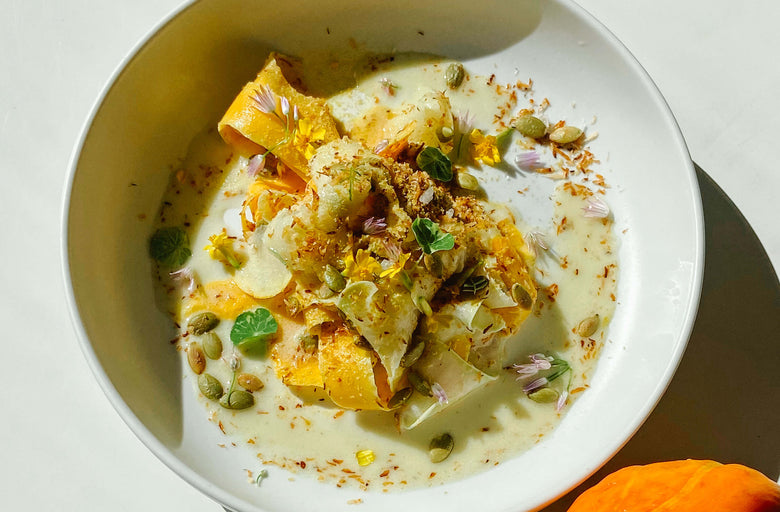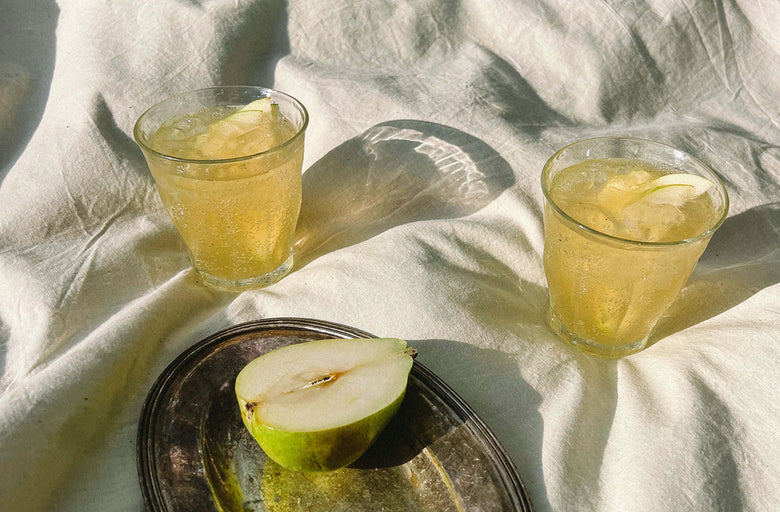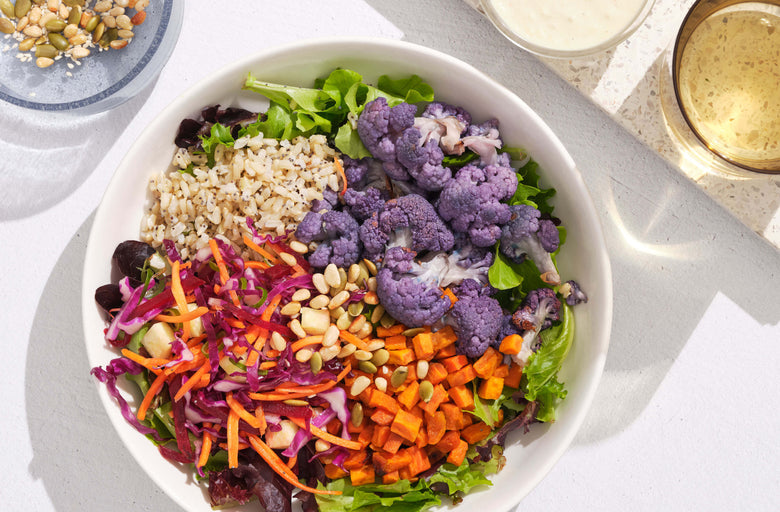To kick off food + nutrition month, we want you to introduce you someone very special to our hearts (and appetites). Meet Sakara Man and chef Gregg Drusinsky: the handsome personality behind your Sakara meals. When Gregg isn't whipping up some of the most holistically nutritious and deliciously fresh meals in NYC, he practices daily meditation and yoga to create balance in every corner of his life #TakeLessonsBoys. While many know Chef Gregg to be a well of information and inspiration in the kitchen, he also happens to be a well to a stream of consciousness most of us have yet to tap into. We sat down with Gregg to dig in, and share with you all of his juicy secrets.
WHEN IT ALL JUST CLICKED
"There was never an aha moment for me with cooking. Ever since I was 12 years old, I just knew it’s what I was going to do. A lot of people go to college to decide what to do with life, but I never had that option, because I never chose. I was destined to be a chef. I grew up in a big house in the suburbs, and it was just me and my mom home because my brother was older and my dad was at work. We had one of those island kitchens with barstools - I use to hang out in there and cook with my mom. It’s just what we always did.
Don’t get me wrong, I tried to do other stuff. I went to business school, but for restaurant management. And then when I moved to New York and started working in professional kitchens, it turned out not to be what I thought. When I was 12 and had this image of what being a chef was going to be like, I thought “I’ll have a normal life, and then a career just doing what I love.” But once I got here and got into it, I didn’t have much of a life outside. The life of a chef can be really daunting. The time that a chef is working is time that everybody else is playing. I wasn’t happy doing that, but I didn’t fully know that I wasn’t happy at the time, because it’s just the way that things were.
I used to come home from work every night and drink a 6-pack of beer, eat a turkey sandwich and watch Family Guy. That is, if I wasn't out partying. I was being a total sludge 365, which was obviously getting in the way of my relationship with my girlfriend at the time. She was a yoga teacher, so one day she made a proposition and said instead of coming home and getting drunk, I should come with her to a class. I was like… “No fucking way, I’m not going to do that because I am a dude and that is for chicks." Finally, she dragged me in and that’s when things changed.
"I started to have this fracture in my life. On one side, I had seen the truth, and then there was my consuming cooking career."
The first thing I noticed was how beautiful everyone there was. Not in a weird way, but it was just an admiration because everyone was so light and healthy, and had this energy about them. Coming from working in a Michelin starred kitchen, I was like “Oh my God this could not be more different.”
I started to go every morning because I just liked the environment. It started to get me blissed out, and I would then go into work and be like “Hey chef what are we making for family meal?!” He’d be like “Wtf is wrong with you… go figure your shit out and get out of my face,” which wasn’t great, so I just started to have this fracture in my life. On one side I had seen the truth - that I could live this other way where I am joyful, and healthy. And then there was my consuming cooking career. It tore me up a good bit, because these two things were so important to me, but they didn’t coexist. I wished that yoga was more about food and food more about yoga.
Then, the aha moment came for me while sitting in meditation after a class. It all clicked - there is no separation between food and yoga. There doesn’t have to be; they can and do coexist. There is no “yoga is this activity that you have to do and then cooking is this completely other thing that you have to do.” No, it’s all one thing. Everything that you do, whether it’s your career, or what you’re putting into your body… everything is interwoven. It’s a lifestyle. I was completely liberated by this.
ON SHIFTING PERSPECTIVE
When I knew it was time to make some changes, I quit my job and started teaching culinary school because I wanted to learn and teach more about the yoga of food. Like, “how do you eat in a yogic way?” That’s now my goal, and anytime I stay off that path now, I can feel it in my bones. I know what’s right or wrong now.
I like making people happy. I’ve always loved the feeling of working in an open kitchen, where when you make something and give someone the food, you can see them enjoy it (or sometimes not enjoy it). It’s an instant gratification. I don’t think it’s necessarily a masculine or feminine thing, but I do think it’s an instinct that I have to just take care of people.
The creative process is so pleasing to me. I like to handle food, work with fire, and with passionate people. I love learning about where it all comes from, how it’s grown, how to eat it. Food is just the way I navigate life. When I’m stressed, I’m eating, when I’m celebrating, I’m eating. I actually just did a kitchari cleanse, and it was really interesting because I enjoyed it a lot, even though I was eating this brown bowl of mung beans and rice all day long. In terms of a cleanse, I think it’s one of the best things out there if you do it in the proper Ayurvedic way. I think I loved it so much because it made me realize a lot things about how our culture eats. We put so much emphasis on what we eat, where we’re going to eat, what our food looks like. We’re so obsessed with it, but really, it’s not that big of a deal. On the cleanse, you’re just eating and it doesn’t fucking matter.
"Sit down and push the stop button and realize when something isn’t good for you. This is what awareness is about, which is the step before meditation."
OPERATING FROM A YOGIC STATE OF MIND
Our culture uses the term “spirituality” like our parent’s generation used “religion”. I think spirituality has a lot of different meanings to a lot of different people. It’s hard for us to define, but I think it’s when people are driven to search for something more, and they find it in some sort of pain. They’re trying to heal, magnate stress, release and dig deep. Their spirituality is their journey to discovery.
I also think that we kind of go around and around in a cycle, repeating the same habits and tendencies in life. We can take a pill or do therapy, but really, the practice of yoga is the work to break the cycle. Yoga is a state, and when we aren’t in that state is when those habits and tendencies come back around.
When this happens, the number one thing that gets me back is meditation, which is really just more of an awareness. When you’re in that cycle, you’re just in mission mode. There’s no real awareness to what you’re doing. You’re not in a controlled sate because it’s just a mission. The first step to making the change is to get back to that awareness, where you’re in a concentration of your thoughts and feelings. Are you not happy every single day? Is your relationship not taking the direction you’d hoped? Sit down and push the stop button and realize when something isn’t good for you. This is what awareness is about, which is the step before meditation.
When you’re going through the motions, it’s easier and you don’t always realize things, because you’re like a needle on a record just going around and around in that groove. You have to lift the needle to get out, which is a difficult process. Things change.
When I started practicing yoga is when I started practicing vegansim and such. And it was hard, because for 27 years of my life I went out with my father once a month to a steakhouse to split a bottle of wine and eat a hunk of meat and talk with him about X Y and Z. But then it was something that truly didn’t appeal to me anymore. Change can feel alienating, and that’s the real challenge. This is why so many people just want to run away. It would just be so much easier, right?
ON FOOD AS ENERGY
Food has science to it, and then a pranic energy or life force to it. If you take two types of food, highly processed food and organic picked-from-the-vine food, there is a vast difference in life between the two. Processed foods have all life removed from them because they are so far removed from the Earth. With that kind of food, you’re essentially just getting caloric content and no life. If you want to translate prana into science, you can essentially talk about micronutrient density, meaning vitamins and minerals. The closer the food is to the source, the more derived pranic value you’re getting, because all the vitamins and minerals are still there. Once you remove a tomato from it's vine, it immediately begins to descend in pranic value. There is no way to capture that. It's a very sensitive thing. That’s why when you get tomatoes at the supermarket, if you look at them, they don't have an aura. They are packed, they've traveled a long distance, and sit for a long time… which is why, from a panic standpoint, we want to eat locally.
"Look for foods that give you a healthy stream of energy throughout your day."
Eat mindfully. You have to make a choice because it will affect you spiritually. You need to concentrate. You have to be able to see God - and I don’t mean God as some dude walking around, but I mean God as the ability to see the pure beauty in everything. You can’t be exhausted and see God. You can’t be exhausted and meditate. You need to be able to concentrate. And unfortunately, you’re not going to get that from a graham cracker.
I think that the appearance of food is also very important to me for a number of reasons. For example, when you go into someone’s home and there’s feng shui, you feel more invited to go sit down in that house and have a comfortable cup of tea in there. In the same way, when you look at a plate of food, you’re either invited to eat it, or you’re not. Food has to look like something you want to dig into. It has to have a certain appearance: color, texture, eatability. I think eatability is a big point. I think a lot of chefs make this really beautiful looking food, but most people just want to take a fork and dig into it. How do we do that, and still make the plate good? It’s an art.
ON BALANCE
Balance is about awareness. It’s about being on that nice, smooth level on consciousness. It’s not about being stimulated. So, you want to look for foods that give you a healthy stream of energy throughout your day. A stream were you don’t have highs and you don’t have lows. I think our culture is so addicted to highs, so we must also be addicted to lows. I think a macrobiotic approach to food is the best way to achieve this balance - a lot of whole grains, brown rice, lots of beans, leafy greens, a portion of cooked vegetables and portion of raw vegetables. And most importantly, squash. You have to be aware of whether what you’re putting in your body is good for you individually or not. You have to honor yourself at all times. Oh, and don’t eat late at night.
They way our bodies interpret sugar and their interactivity with complex carbs is really important to spirituality. If you’re receiving a high spike in sugar from say, coffee or candy, then you’re going to crash eventually. What goes up must come down. That up and down and up and down is the way that most people interact with food in our culture. Need another coffee… need another sugary muffin… that’s just not stable.
AN INTIMATE LEGACY
There can be so much me, me, me in everything, and that makes me a bit upset. The number one thing I think about when I lay my head down is how I interacted with people at the end of the day. Did I piss everybody off? Which is an occurrence with me because I have a big mouth and I say what I feel. I just want for everyone that I came across throughout the day feel better and not worse after interacting with me.
What I want to leave behind in terms of food is just better access to better food. I think that people can get so caught up in the hype of food, that better food is the better content of the food. I think we’re too caught up in the way food tastes actually. When you eat a healthy bowl of vegetables and a simple piece of protein, with not too much salt, you’re not blown out of the water, but you'e doing an important thing for your body.
"Food is just the way I navigate life."
The number one take away for me is that when you suit up and put that apron and chef’s coat on, it means something. To me, it means responsibility. When I’m at work, I’m present, because I am going to prepare something that somebody is going to ingest in their body. That’s really serious and intimate. For far too long, the responsibility of a chef was to make the food taste the best way in a cost effective manner. The focus is this instant gratification of sugar and pop, and how that person feels while eating it. No one is putting responsibility on how that person feels after the meal, or the morning after eating it. It’s this shift in perception.
My responsibility is to give you something healthy that makes you feel good and well. As a chef, if you're making something from a healing perspective, which is where I’m trying to go with this, it can feel impossible and you can get caught back in that rut. We can’t just be putting fried food on the menu to please people. It’s an uphill battle, it really is.
*GET BLISSED! Chef Gregg's Recipe For A Blissful Day here











